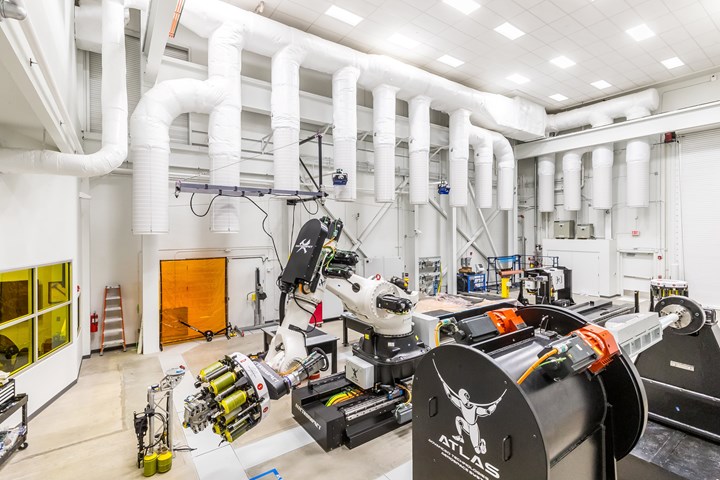Multi-disciplinary lab supports automated manufacturing research, prototyping
CAMX 2023: ATLAS, part of Wichita State University’s NIAR, is an integrative manufacturing environment and engineering education program for advanced manufacturing R&D with state-of-the-art machines, software and processing options.
Launched at the beginning of 2019 and currently employing more than 120 research engineers and student technicians, the Advanced Technologies Lab for Aerospace Systems (ATLAS) facility at Wichita State University’s National Institute for Aviation Research (NIAR) is a makerspace for industry-scale automated manufacturing research. As a manufacturing innovation center, ATLAS has created a multi-disciplinary manufacturing environment and an engineering education program to prepare engineers and educators for the factory of the future and to aid current workforce in seamlessly adapting to advancements in the workplace through workforce education programs.
Integrating state-of-the-art technologies at industry scale, ATLAS has become an extension of global aerospace R&D capabilities. Some of its technologies include automated fiber placement (AFP) and automated tape laying (ATL) from multiple venders, fiber patch placement (FPP) for complex geometries, thermoplastic welding and thermoplastic overmolding for multifunctional integrated structures.
The addition of an enhanced Electroimpact scalable robotic additive manufacturing (SCRAM) system with polymer and metal additive large-scale printing (up to 16' long parts), five-axis milling and thermoplastic AFP capabilities, enables users to additively manufacture hybrid prototype tooling and machine to final geometries. Users can also explore the possibility of manufacturing parts with sacrificial additive tooling for complex parts. This system furthers ATLAS’ capability to support aggressively scheduled manufacturing research programs by reducing the time required for machining prototype tooling. It also provides advanced solutions for part design such as topology-optimized hybrid structures and water-soluble tooling solutions for complex structural shapes.
The applied learning workforce model is said to be one of ATLAS’ greatest assets. It enables closely monitored student technicians to work alongside experienced, knowledgeable full-time staff with industry experience. Being a part of the university system, the primary mission of ATLAS is to create a pipeline of “industry-ready” future engineers for advanced manufacturing processes with machine learning and artificial intelligence as well as to develop a workforce training programs for advanced manufacturing technologies.
ATLAS staff works closely with industry partners to develop ways to increase efficiency, productivity and quality. Companies that don't have access to advance automated manufacturing technologies can assess state-of-the art manufacturing capabilities, prior to making a large investment. Furthermore, data gathered during manufacturing research and prototyping on these industry-scale systems at ATLAS can be used for designing factories. ATLAS is developing training programs to enable companies to rapidly scale these new manufacturing operations across multiple production lines.
Related Content
-
R&D focus underpins quality gelcoat offerings
CAMX 2024: HK Research strives for innovation and customer satisfaction through meticulously produced polymers, liquid pigments and specialty additives and customer support.
-
One-stop composites manufacturer, distributor
CAMX 2023: FiberGlass Coatings provides B2B and B2C and services to meet fiberglass and coating product needs.
-
CAMX 2024 Show Daily: Wednesday, Sept. 11
The second day of CAMX 2024 has all sorts of things in store for attendees, from Tuesday’s keynote centered around the world of AI, to award and poster session winners and what to look forward to at Good Day, CAMX on Thursday.

















